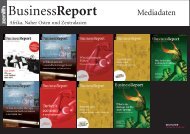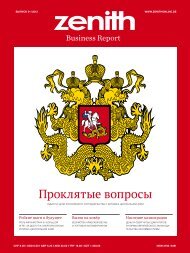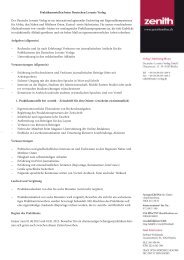You also want an ePaper? Increase the reach of your titles
YUMPU automatically turns print PDFs into web optimized ePapers that Google loves.
Ericsson, Hewlett Packard and IBM were all<br />
quick to open their own offices. Local ICT<br />
companies, frequently offering business<br />
process outsourcing (BPO) services, also<br />
moved into the Smart Village. One example<br />
of the trend would be Xceed, the Call Centre<br />
arm of Telecom Egypt.<br />
But what exactly drove the company to<br />
outsource its business processes to Egypt?<br />
»For one thing, Egypt is located in a favourable<br />
time zone, which is particularly useful<br />
for Call Centre services«, explains Rabah<br />
Khoury of Xceed, »We can serve the needs<br />
of European customers in one shift and<br />
American or Asian customers in the other.<br />
Another bonus is that it is only a quick flight<br />
away from many different locations.« The<br />
fibre-optic cables connecting Africa, Europe,<br />
Asia and even Australia, also run<br />
through Egypt.<br />
The Mubarak government invested heavily<br />
in the industry following the launch of<br />
its master plan for telecommunications in<br />
the year 2000, with the result that it is now<br />
based on fibre-optic cables that can be connected<br />
to the international ones. It was an<br />
investment that came back to haunt the regime.<br />
Egypt’s high-quality connectivity was<br />
what helped the protest movement grow, so<br />
in desperation the government then put a<br />
stranglehold on almost all internet traffic.<br />
Apart from the assurance of the Smart<br />
Village owners that they can guarantee<br />
normal operating conditions under any<br />
circumstances, the low running costs make<br />
Egypt an attractive business location.<br />
According to a study by the World Economic<br />
Forum, this outsourcing destination<br />
with average operating costs of USD 14,700<br />
per year is cheaper than either the Philippines<br />
or India.<br />
In 2004 the »Information Technology Industry<br />
Development Agency« was created<br />
within the Ministry for Telecommunications.<br />
This agency not only ensured that ICT<br />
companies benefited from discounted land<br />
prices and tax breaks, but also initiated some<br />
new laws, including the »e-signature<br />
law«, making transactions possible with just<br />
electronic signatures.<br />
One of the things that drove the young people<br />
onto the streets is also of huge benefit to<br />
the ICT business – the fact that highly qualified<br />
employees are cheap to employ here<br />
due to the oversupply of trained IT specialists.<br />
More than half of the Egyptian population<br />
is under 25 years of age. Every year<br />
some 330,000 young students graduate<br />
from its universities – including over 90,000<br />
majoring in subjects relevant to the ICT sector.<br />
The official unemployment rate is 9.4<br />
percent.<br />
A programmer earns an average of USD<br />
157,000 a year, which makes Egypt more<br />
cost-effective than all of the Eastern European<br />
ICT destinations; only India is cheaper,<br />
and the same principle applies to Call<br />
Centre services.<br />
The president‘s son<br />
played big business<br />
Many young Egyptians have strong ties to<br />
Europe and learn various European languages<br />
from an early age. While in India many<br />
people can only speak English as their<br />
foreign language, Egyptians often have a<br />
working knowledge of Spanish, French,<br />
Italian or German. Furthermore, Egyptian<br />
Arabic is the dominant language of films,<br />
music and television in the entire Arab region<br />
and is therefore understood everywhere.<br />
Xceed sends its Call Centre agents<br />
on special training courses to ensure they<br />
speak European languages with no foreign<br />
accent. »Customers in Europe should not<br />
be able to tell they are talking to an Egyptian«,<br />
is the company policy.<br />
After numerous national and international<br />
banks acquired office space in the Smart<br />
Village, a small financial district has emerged<br />
within a garden landscape. »There are<br />
green spaces and lakes here that can also be<br />
used as water reservoirs to put out any fires«,<br />
explains the woman giving investors a guided<br />
tour of the village. »You forget the fact<br />
that the entire complex is basically located<br />
in the middle of the desert, with all this<br />
MONEy AND POwER<br />
green around you.« Although the Smart<br />
Village Company claims it wants to demonstrate<br />
its care of the environment, visitors<br />
cannot see much evidence of that yet.<br />
The overthrown Mubarak and his son Gamal,<br />
who stood for the big business policies<br />
of Egypt, also used to enjoy taking visitors<br />
on guided tours of the complex.<br />
The government wanted to ensure even<br />
more local firms thrived in the ICT domain,<br />
by offering them special incentive programmes.<br />
It had signed agreements with international<br />
ICT firms like Nortel, Atos Origin and<br />
Siemens to transfer their technologies to<br />
Egypt and, in return, benefit from modern<br />
infrastructure at a discounted price. The<br />
long-term goal behind this was to diversify<br />
the country’s sources of foreign exchange.<br />
The other measures taken to promote the<br />
ICT sector can also be seen in this context.<br />
Egypt has a negative balance of trade, and<br />
a large proportion of its foreign exchange<br />
comes from the volatile business of oil and<br />
gas. And the main sources of income for<br />
foreign currencies so far – tourism and the<br />
Suez Canal – are highly susceptible to global<br />
fluctuations.<br />
The economy under Mubarak was to be<br />
liberalised within the framework of a fiveyear<br />
plan, which included the removal of<br />
various taxes and customs duties. It was<br />
hoped this would encourage direct foreign<br />
investment and more exports. Apparently<br />
the government saw the ICT sector as a<br />
particularly profitable branch of industry,<br />
for the subsidies certainly flowed freely.<br />
But it was only the already privileged Egyptians<br />
who profited from the boom: the<br />
small upper class, opportunistic businessmen<br />
and the apologists of the regime. Many<br />
of the companies represented in the<br />
Smart Village, who also invested in it, belong<br />
in whole or in part to Gamal Mubarak<br />
himself, or to his relatives and close friends<br />
or entourage – including Gamal Sadat, the<br />
son of Murabak’s predecessor Anwar al-<br />
Sadat, who was murdered in 1981. What<br />
will become of those shares in companies<br />
located in the Smart Village is still a long<br />
way from being decided.<br />
BusinessReport 1/2011 13

















